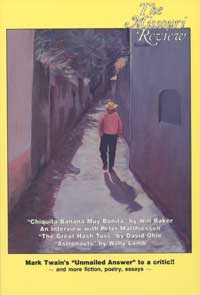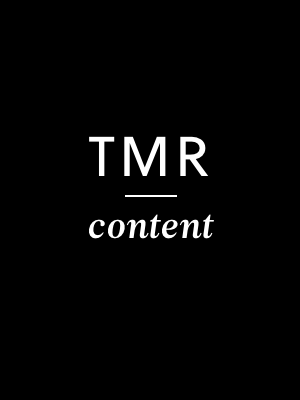ISSUES | summer 1989

12.2 (Summer 1989)
Featuring work by Will Baker, Bruce Beasley, Tibor Dery, Don Kreck DuPree, Stuart Friebert, Michael Gurian, Joseph Harrison, Lola Haskins, G.W. Hawkes, Ben A. Heller, David Keller, Thomas E. Kennedy, Leonard Kress, Wally Lamb, Dixie Lane, Jean Matthew, Robert McNamera, Jack Myers, Eric Nelson, David Ohle, Suzanne Paola, Valarie J. Russell, Luis Omar Salinas, Steven Schwartz, Kathleen Shumate, James Simmons, Jon Veinberg, Julia Wendell, Lisa Weiland, Steve Weinberg, Peter Wild, Ruth Yunker… an interview with Peter Matthiessen by Kay Bonneti… and a found text by Mark Twain.
This issue is sold out!
CONTENT FROM THIS ISSUE

Poetry
Jun 01 1989
Successions
This poem is not currently available online.

Poetry
Jun 01 1989
An Importance of Place
This poem is not currently available.

Fiction
Jun 01 1989
It's Love, Buddy
My mother has resurfaced in central Illinois. I read it in the newspaper, Articles from Around the Nation. Stone flamingos disappear from lawns, the article said. I know that’s her. I know how she does it. No one thinks twice when they see an old lady around the neighborhood. She makes friends with the dogs and when she goes back to lift the birds, there’s no trouble. Bones in her pockets and a good idea of the whole neighborhood’s schedule, she’d make a good thief.

Poetry
Jun 01 1989
Any Promise Made
This poem not currently available online.

Poetry
Jun 01 1989
Poetry Feature: Stuart Friebert
“Caesarean”
“But Names Will Never Hurt You”
“Little By Little”

Poetry
Jun 01 1989
Poetry Feature: Dixie Lane
“Doll Hospital”
“Snake in the Piano”

Fiction
Jun 01 1989
The Corner View
The room was large. It was blue and white. There were gilt, mirrored doors on the armoires. A small but elegant crystal chandelier hung in the center of the room. Pristine, handpainted beds. The room was beautiful. But the view of the lake, was not the right one. It was only a corner view. One had to step out onto the tiny balcony and turn one’s head a hard left in order to see it. I saw in an instant that no amount of beautiful room would alleviate this.

Found Text
Jun 01 1989
Unmailed Answer
In 1886 Mark Twain received a letter from a former newspaper editor requesting a recommendation from Twain for a government “consulship.” But the poor fellow did not reckon with Twain’s remembering… read more

Poetry
Jun 01 1989
Poetry: Jon Veinberg
“The Beginning of Ritual”
“The Voyeur”

Poetry
Jun 01 1989
Vanysshynge
This poem is not currently available online.

Fiction
Jun 01 1989
Home
The soldier stopped by the gate to the house and stood for a moment. A rank smell of garbage, urine, and boiled cabbage seeped out from the tenement house in Angyalfold and, like a familiar motherly voice in his consciousness, insinuated itself into the soldier’s nose and lungs. He swallowed hard and blanched with joy. It was exactly the same odor he had left behind six years ago when he went out through the gate to join his regiment. Neither in the Ukraine, nor late as a prisoner-of-war did he encounter it. The closest to it were smells in the homes of more or less distant relatives, but they barely stirred his memory; none spoke to him in his mother tongue. But this…this smell was the smell of home; this smell was his country.

Poetry
Jun 01 1989
Poetry Feature: Lola Haskins
“Django”
“Of the Pleasures That May Be Discovered in Books, 1902”

Poetry
Jun 01 1989
Poppy Seeds
This poem is not currently available online.

Poetry
Jun 01 1989
Poetry Feature: Jack Myers
“Why Don’t You Ask Your Father? Fugue:”
“I Don’t Know, You Probably Know Everything I Know”

Nonfiction
Jun 01 1989
Telling Lives
When Robert Caro finished the biography of Robert Moses in 1974, he marked an end to seven years of research on the man who built twentieth-century New York City, influencing urban planners the world over. The Power Broker: Robert Moses and the Fall of New York won the Pulitzer Prize for biography as well as the Francis Parkman Prize, awarded by the Society of American Historians to the book which “best represents the union of the historian and the artist.” It was quite an accomplishment for a former newpaper reporter turned first-time biographer.

Poetry
Jun 01 1989
Nigerian Cattleman's Song
This poem is not currently available online.

Poetry
Jun 01 1989
The Fear of God
This poem is not currently available.

Interviews
Jun 01 1989
An Interview with Peter Matthiessen
“If you find yourself coming back the next day and erasing more of the so-called improvements than you keep, you’d better get the hell out of that book.”
“We all must make an effort for the betterment of mankind, even though we know it won’t do any good.”

Poetry
Jun 01 1989
The Excavation
This poem is not currently available online.

Fiction
Jun 01 1989
Necati Bey
It’s many years later. Necati Bey is presumably still doing his businness in Ankara, in that area of the old city called Copper Alley, and I’ve been back in the States for years. My hair is turning grey at the sides–only little filaments, but enough to make a statement. I’ve settled in with a second wife, a child on the way. It’s still hiding inside her; sometimes I think it’s watching us. I often asked Necati Bey why I had the urge to move back to Seattle after so many years overseas. He sat across from me at the backgammon board in his tiny shop, produced one of his store of Turkish proverbs–“It seems there is bread there for you to eat”–then took advantage of my distracted concentration. I lost a lot of money to him, but he predicted a good life for me upon my return to the States and perhaps I’ve found it. And in a few months, more sustenance, in the form of a young mystery is coming. Perhaps this is why I am remembering Necati Bey. But there is of course more.

Fiction
Jun 01 1989
9:14 Elizabeth
I hadn’t seen her in fifteen years and the first thing I said when she sat down was, “Jesus, what’s happened to you?” and the first thing from her was, “Can’t you tell a girl she looks nice?” “You look swell,” I said, “but what happened?” “Marriage.”

Nonfiction
Jun 01 1989
Back at the Ranch: Visions and Voyeurism
The worst of it, the headline-grabbing part, was a body found in the cellar of the family mansion, two shotgun blasts in the stomach, a pistol shot in the head. The verdict was suicide.

Nonfiction
Jun 01 1989
The Great Hash Toss
Ambrose: I met Fransisco Ponce on Rue St. Andre des Arts, a street leading into Place St. Michel, on the Left Bank. There were sporadic riots all through that summer, especially in the area of Boulevard St. Michel. The Companie Republicaine de la Securite, the CRS, the French riot polics, were cruising around. They were rough guys, guys that came out of prison. Brutal types. There were rapes of students and killings of factory workers.

Fiction
Jun 01 1989
Chiquita Banana Muy Bonita
Dedos and he looked at each other only once when the couple strolled out of the ruin and then along the dusy road through the market. The camera was still in its case around his shoulder. They were talking animatedly about the great stone figure they had just seen. The two young men stayed twenty yards back, apparently idling away the afternoon. Children they knew called out and muttered alongside and glared, but the two men only bowed mockingly at these old crones, who brooded all day long above the dark toadstools of their volumnious skirts, surrounded by plastic buckets or sacks of coarse-ground corn, heaps of sweaters or small replicas of the gods inside the ruin.

Fiction
Jun 01 1989
The Great Master
Years passed in this way, this dull, grey quotidian. I was nothing, an endless succession of days, today disappearing into the blur of a past so undistinguished as barely to exist. I decided to eat everything in the house. It seemed a worthy project. To void the house of food. It would be a pure act in an impure world. Bottles, jars, biscuit tins would become pure in its frost, empty, sterile as the white tundra. My body would become a shelter, sculpture, art.

Poetry
Jun 01 1989
Sunrise
This poem is not currently available online.

Poetry
Jun 01 1989
Love Rushes By
This poem is not currently available online.

Poetry
Jun 01 1989
The Harrowing of Hell
This poem is not currently available online.

Poetry
Jun 01 1989
Poetry Feature: Ben A. Heller
Featuring the poems: Orchids, Etc. The Joke

Poetry
Jun 01 1989
As You Stand Peeling an Orange
This poem is not currently available online.

Fiction
Jun 01 1989
Astronauts
“Next slide,” the astronaut says. For a second, the auditorium is as void and dark as space itself. Then a curve of the earth’s ulcerated surface flashes on the screen and the students’ silhouettes return, bathed in tones of green. This is the third hour in a row Duncan Foley has seen this picture and heard the smiling public relations astronaut, sent, in the wake of the Challenger disaster, to the high school where Duncan teaches. It’s September; attendance at the assembly is mandatory.

Poetry
Jun 01 1989
Matisse's Chapel, Venice
This poem is not currently available.

Fiction
Jun 01 1989
Uncle Isaac
My Uncle Isaac’s sexuality, according to my father’s theory, had been marked by the half-woman. Isaac, at thirteen, would sneak into the basement of the Philadephia Medical Museum where a woman’s torso floated in formaldehye. It was 1933, and here–beneath the museum’s upper floors with their public exhibits–reasearch and training about venereal disease was taking place. In a reinforced glass case, at the back of a laboratory room filled with charts and diagrams of progressive syphilis, rested the half-woman, clean of infection except for a lesion on her left breast.

Poetry
Jun 01 1989
The Scene
This poem is not currently available online.
